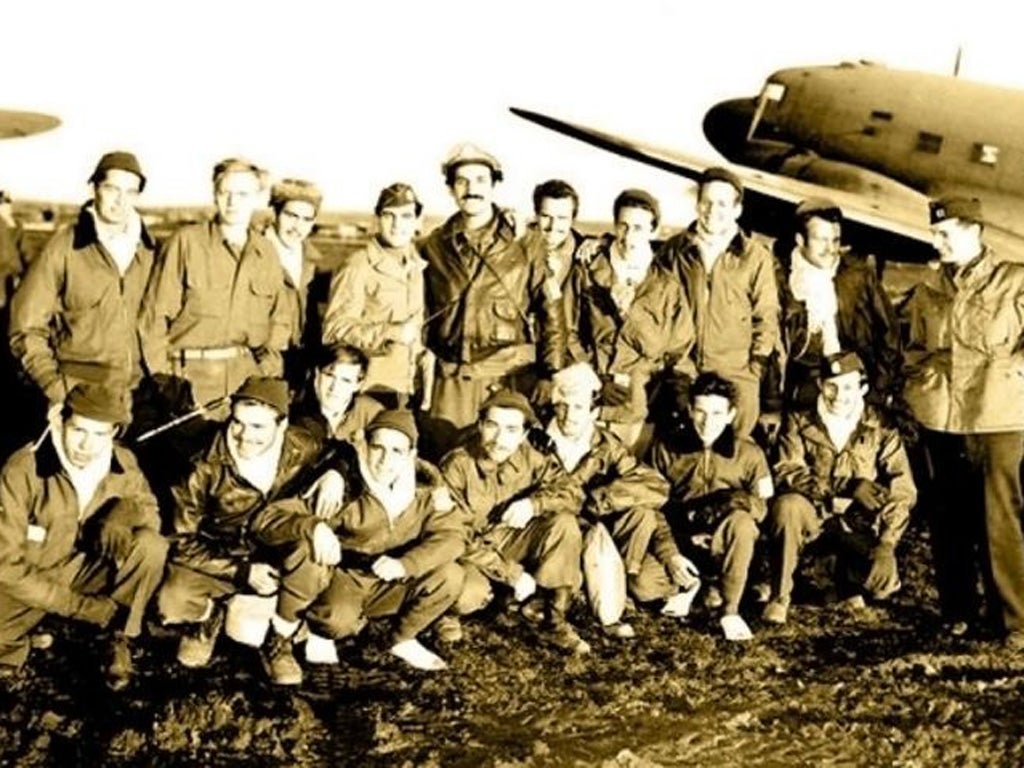George Vujnovich: OSS agent whose Operation Halyard saved allied airmen
A runway for the cargo planes was built on a plateau only 50 yards wide halfway up a mountain

Major George Vujnovich was an OSS agent who planned and organised one of the greatest rescue missions of the Second World War, Operation Halyard. Audacious and daring, its execution, over a six-month period between July and December 1944, was flawless and saw 512 Allied airmen stealthily rescued from behind enemy lines in Nazi-occupied Yugoslavia without a single casualty or loss of an aeroplane. However, the operation remained secret for over 60 years thanks to the political intrigues of post-war Europe and the Cold War.
The son of Serbian parents who emigrated to the US in 1912, George Mane Vujnovich was born in Pittsburgh in 1934. He won a scholarship from the Serb National Federation to read medicine at Belgrade University and there met and married Mirjana, a teacher. In April 1941, following the Luftwaffe's bombing of Belgrade, the couple fled, ending up in West Africa, where George got a job with Pan Am Airlines. His wife reached the US and secured a job at the Yugoslav Embassy in Washington.
With America's entry into the war Vujnovich received a commission as second lieutenant and assumed command of an airbase in Nigeria. There he was recruited by the Office of Strategic Services, the US intelligence organisation that preceded the CIA, because of his knowledge of Yugoslavia.
After the Allied invasion of Sicily in July 1943, and the successful landing on mainland Italy in September, Italy capitulated. With the Allies in control of southern Italy they turned their attention to the lifeblood of Hitler's war machine, the petroleum refineries in Romania. During the summer of 1944 they flew thousands of sorties against the oil refineries around Ploesti, a major fuel source for Germany. But as they flew from Italy and across Yugoslavia to get there, losses were high, with about 1,500 crews bailing out over Nazi-occupied territory. Yugoslavia was enemy territory but much of its Serbian regions remained under the control of the Yugoslav resistance leader Draza Mihailovich and his Chetnik forces. At great risk to the Serbians many airmen were found and sheltered from the Nazis.
Also opposing the Nazis were the Communist Partisans under Josip Broz Tito, a Croat who had joined the fight after Germany invaded the Soviet Union in June 1941. Tito wanted to rule a Communist Yugoslavia after defeating the Nazis, but Mihailovich stood in the way. Mihailovich passed information about the downed Allied airmen to the Yugoslav Embassy in Washington from where it went to the US authorities, and, thanks to his wife, to Vujnovich, who was by then based in Bari in southern Italy.
Vujnovich devised an escape plan; although the US State Department and the British opposed the mission, General Nathan Twining, commander of the 15th Air Force, wanted to get "his boys" back and President Roosevelt approved. Because Winston Churchill did not want him making direct contact with Mihailovich, Vujnovich was not allowed to go.
Following a number of aborted attempts, Operation Halyard commenced on 2 August 1944, when a three-man Serbian-speaking OSS team trained by Vujnovich parachuted into Serbia. "I had to show them how to tie their shoes and tuck the laces in, like the Serbs did, and how to eat like the Serbs, pushing the food on to their fork with the knife," Vujnovich recalled.
In the village of Pranjani, 30 miles from a German garrison, 200 airmen and 300 Chetniks built a 700ft dirt airstrip on a plateau 50 yards wide halfway up a mountain, the minimum length needed to land the C-47 cargo planes that would carry the airmen to safety. Thanks to Mihailovich's guerrillas, who secured the terrain, the operation was successful.
Over the next six months Allied planes flew undetected under Axis noses to rescue 512 airmen. The first four C-47 transporters were sent at night to the unlit runway, with the plateau surrounded by mountain ranges, but the landings were deemed too dangerous, so later flights were made during the day with fighter planes providing cover. Most of the airmen were picked up at Pranjani, but some were rescued from improvised airstrips elsewhere in Yugoslavia.
After the war there was much blood-letting in Yugoslavia; Mihailovich was captured by Tito's forces and accused of collaboration with the Nazis, which he denied. He was executed in July 1946. He was, however, posthumously, and secretly, awarded the Legion of Merit by President Truman in 1948, a belated recognition that he had, in fact, been a strong American ally.
Vujnovich accepted an award from the OSS Society in 2008 and received the Bronze Star in 2010. "This mission would not have succeeded without the great courage of Draza Mihailovich and his brave men," he said.
After the war, Vujnovich ran a business supplying parts to aircraft companies.
George Mane Vujnovich, OSS agent: born Pittsburgh 31 May 1915; married Mirjana Lazich (died 2003; one daughter); died New York 24 April 2012.
Join our commenting forum
Join thought-provoking conversations, follow other Independent readers and see their replies
Comments
Bookmark popover
Removed from bookmarks